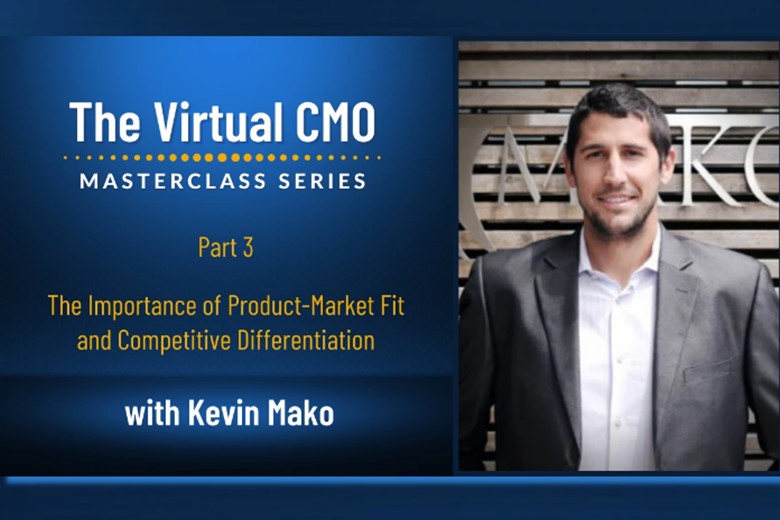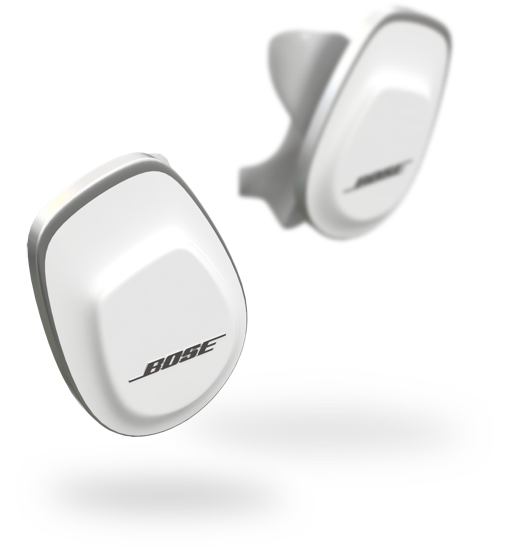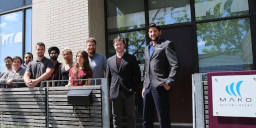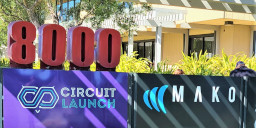As a top product design firm in Miami, we encourage our clients to look beyond the idea and put effort into determining product-market fit and competitive differentiation. To provide more insight into these topics, marketing powerhouse Eric Dickmann invited Kevin Mako to speak on The Virtual CMO podcast.
This is the third episode in this tremendously informative masterclass series on building a strategic marketing plan for your business. These podcasts are a must-listen for anyone who’s eager to learn more about marketing strategies.
Eric is the Founder of The Five Echelon Group, a strategic marketing consulting service catered to small and mid-sized businesses. Their methodology is to discover improvement opportunities, diagnose these opportunities by help building strategies and deliver meaningful results by connecting clients with the right resources to help execute said strategies.
Top Product Design Firm, MAKO Design + Invent, Invited to Share Marketing Expertise on The Virtual CMO Podcast
Why do we choose certain products over others? In some cases, it might be instinctive – for example, when we go to Costco and immediately grab the oversized box of Kirkland tissues without thinking twice. In other cases, we might want a product because it has social value to us.
If you have kids, they’ve probably begged you to buy them the latest iPhone at some point in your life only because their friend has one, too. But what about brands that aren’t quite established yet?
Startups and new inventors should consider where their product fits in the market and define the competitive advantages of their products. The industry terms for these concepts are product-market fit and competitive differentiation.
If you’re not familiar with these terms, take a quick read below to brush up before listening to the podcast. In this article, we’ll help define these two topics and teach you how they may fit in with your marketing plan. For detailed case studies and explanations, we recommend listening to the podcast here!

Product-Market Fit
What is Product-Market Fit?
This is an industry term coined by Marc Andreesen in 2007. Product-market fit means being in a good market with a product that can satisfy that market. Simply put, your product is:
- A solution to a pain point in a market.
- A solution customers want to buy.
How do You Achieve Product-Market Fit?
Through “brilliantly simple design,” as Kevin stated in the podcast. This slogan is a pillar of our product development process at MAKO Design + Invent. Being the top product design firm in Miami, we want to put our clients on a path to success. This means helping them focus on a niche and guiding them away from giving in to the fear of missing out on potential customers.
Kevin hammers on this point time and time again: “Although you may think you’ll be alienating the other parts of the market, although you’ll be losing certain key customers that you think might make sense, it’s far easier to make sales if you can really hone down who that target customer is and create a product that only satisfies that person.”
Let’s unpack this.
In his second point, some inventors think they’ll lose customers who may be part of their market. The key here is “may.” Even with extensive research, you don’t know how customers will react to your product until you get it in their hands. To explain this further, we’re going to touch on the topic of competitive differentiation in the next section of this article.
Regarding the first point about alienating parts of the market, we find that new inventors gravitate towards building a feature-heavy product to avoid this. So, their goal is to solve a multitude of problems simultaneously to capture a wider audience. However, as Kevin continues: “The more complicated a product is, the exponentially more expensive it is to develop.”
Thus, small businesses and startups should be honest and realistic about their development budget. Rather than packing every possible feature into a single product, we want to help our clients maximize their resources. Good inventors achieve this by solving a specific pain point in a specific target market.
How Does Product-Market Fit Affect Marketing?
- Elevator Pitch
If you can’t verbally explain your product in a minute or less, it probably means your product is too difficult to explain. On the other hand, you’ll have a much easier time generating interest in your product if your customer can quickly understand how your product solves a pain point.
- Reviews
A product that’s difficult to build is prone to manufacturing issues and defects. Defective products lead to warranty claims, which hurt the bottom line. Increased warranty claims mean more negative reviews. Small businesses and startups should consider positive reviews as a crucial part of their marketing plan in order to build trust with their customer base. In fact, 92 percent of B2B buyers are more likely to purchase after reading a trusted review. Well-established brands have the flexibility to release duds in the market because they can always fall back on their Cash Cow or Star products in their portfolio. Startups and small businesses often don’t have this luxury.

Competitive Differentiation
What is Competitive Differentiation?
Competitive differentiation is how you set your product apart from competitors in your market. It’s how top product design firms, like MAKO, separate themselves from the rest. There are two components to successfully achieve this:
- Your product has a distinct advantage over your competitor’s product.
- You promote these advantages in a way that attracts your customers to your product over your competitors.
As the top product design firm in Miami, we encourage our clients to focus on building an MVP (Minimum Viable Product) to test your product with real people. Learn how your intended audience uses or neglects features. Find out if it’s difficult and crude or easy and enjoyable to use your product as opposed to your competitors. After all, your goal is to receive feedback about the user experience in order to achieve competitive differentiation.
How to Achieve Competitive Differentiation
A great way to get instant feedback is to showcase your product to customers and B2B businesses at an industry expo. That being said, how do you get a potential customer to pick your MVP over a competitor’s? You might have the best technologies and functionality in your product, but how will anyone know until they try it?
Kevin highlights one simple yet often overlooked factor: “If you’re creating a product in 2021 and looks like it was made in 1995, you’re going to have a rough ride.” To get people to try your product it should have a modern design. When we see a product for the first time, we first judge its appearance. This is why the design is one of the key elements that influence a customer’s purchasing decision.
Lucky for all of us, it’s an exciting time to be a part of this industry. Today, manufacturing is more fluid than ever before. With the advent of new technologies, startups and small businesses have the option to leverage short-run manufacturing processes to rapidly produce 50 or 100 units for testing. As a result, businesses save an incredible amount of money over traditional mass-production manufacturing.
Another added benefit to consider is how much easier it is to update your product as technology evolves. Why is this important? Because even the underappreciated plug, like the USB cable, has evolved over the years. “If you’re not using the latest, you have to plug in that USB cord and figure out if it’s up or down,” explains Kevin. “You can plug it in straight either way.”
Since USB Type-C is currently the industry standard, products that are only compatible with older USB connector systems introduce a new pain point for customers. As Kevin states, don’t think these are just small nonsensical changes either: “It’s very important to have those best practices to revitalize, which is its own innovation in itself – that’s the next evolution of the product. The best companies in the world are doing it, so you should as well.”
How Does Competitive Differentiation Affect Marketing?
- Key Selling Points
We started this blog by talking about the iPhone, so let’s circle back to this. The iPhone is packed to the brim with state-of-the-art consumer technology. And yet, Apple focuses specifically on the iPhone camera as one of the key selling points. Generation after generation of iPhone releases, Apple learned that the camera is what customers care about and use the most. It’s a selling point that’s easy to understand. More detailed photos, triple cameras, and higher definition video capture are all easy concepts to understand. We’re able to grasp innovations in these areas without much explanation because of how regularly we take photos and videos with our phones.
But how are we so sure this is one of the iPhone’s key selling points? At Apple’s 2019 product press conference, they spent more time talking about the iPhone 11 Pro camera than Apple Arcade, Apple TV, or even the iPad. Not convinced yet? Then, take a look at the iPhone 12 Pro web page. Scroll down to see how many sections are dedicated to the camera, video recording capabilities, and photo quality. And when you’re done reading this article and finally get to turn on the TV to chill out, count how many iPhone commercials feature the “Shot on iPhone” slogan.
But don’t actually turn on your TV. Instead, do yourself a favour and listen to the top product design firm in Miami on The Virtual CMO podcast.
About: MAKO Design + Invent is the original firm providing world-class consumer product development services tailored to startups, small manufacturers, and inventors. Simply put, we are the leading one-stop-shop for developing your physical product from idea to store shelves, all in a high-quality, cost-effective, and timely manner. We operate as one powerhouse 30-person product design team spread across 4 offices to serve you (Austin, Miami, San Francisco, & Toronto). We have full-stack in-house industrial design, mechanical engineering, electrical engineering, patent referral, prototyping, and manufacturing services. To assist our startup and inventor clients, in addition to above, we help with business strategy, product strategy, marketing, and sales/distribution for all consumer product categories. Also, our founder Kevin Mako hosts The Product Startup Podcast, the industry's leading hardware podcast. Check it out for tips, interviews, and best practices for hardware startups, inventors, and product developers. Click HERE to learn more about MAKO Design + Invent!







